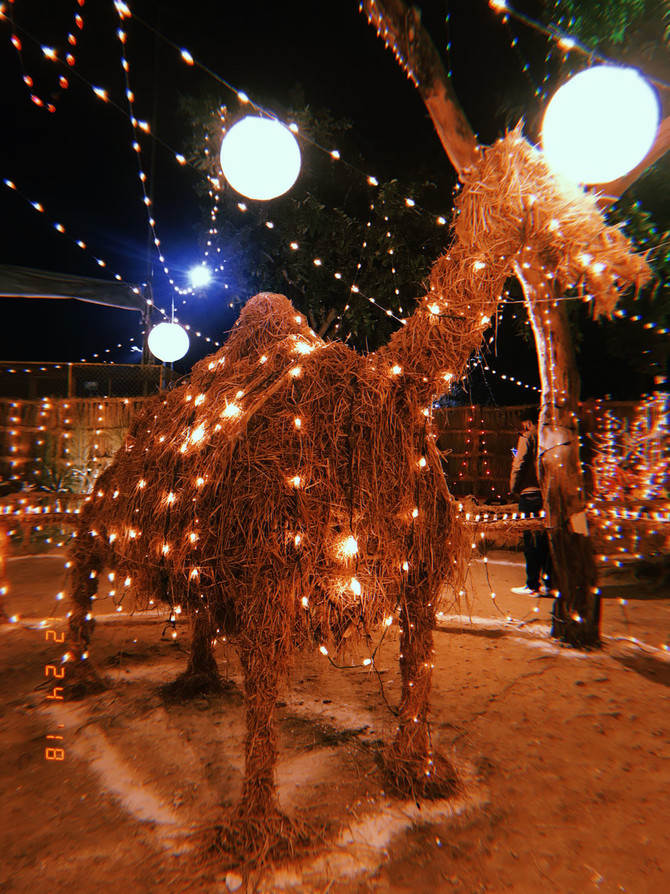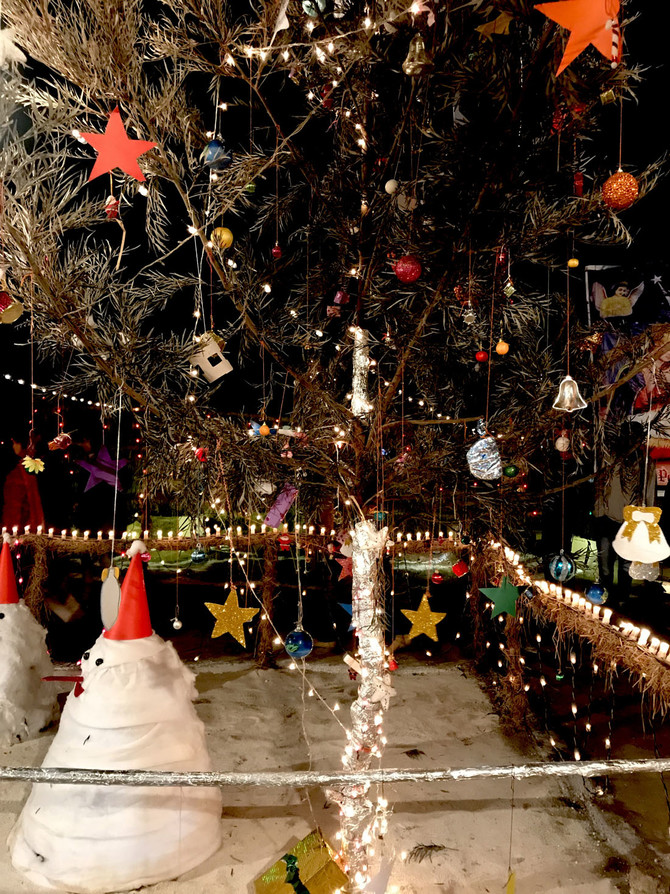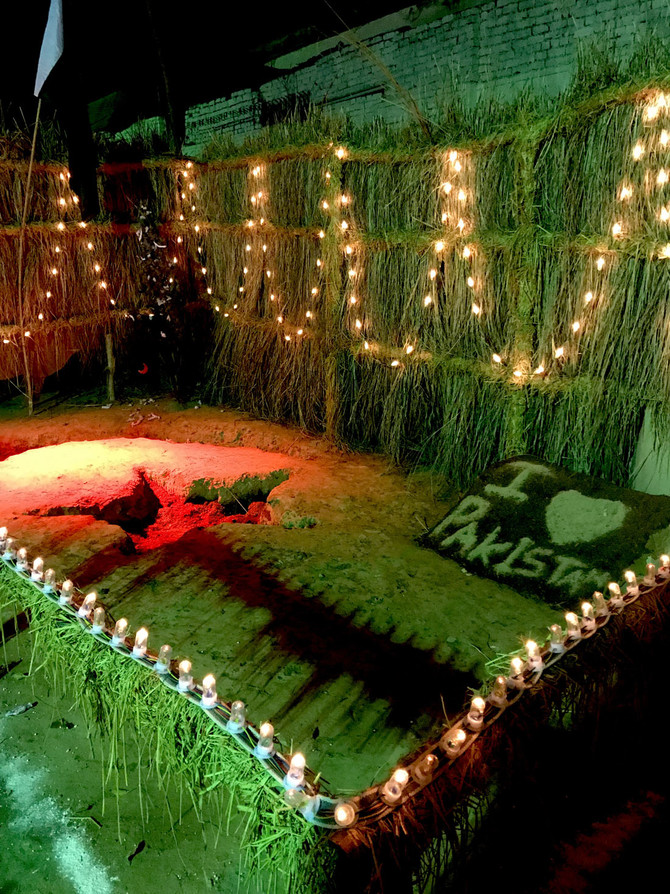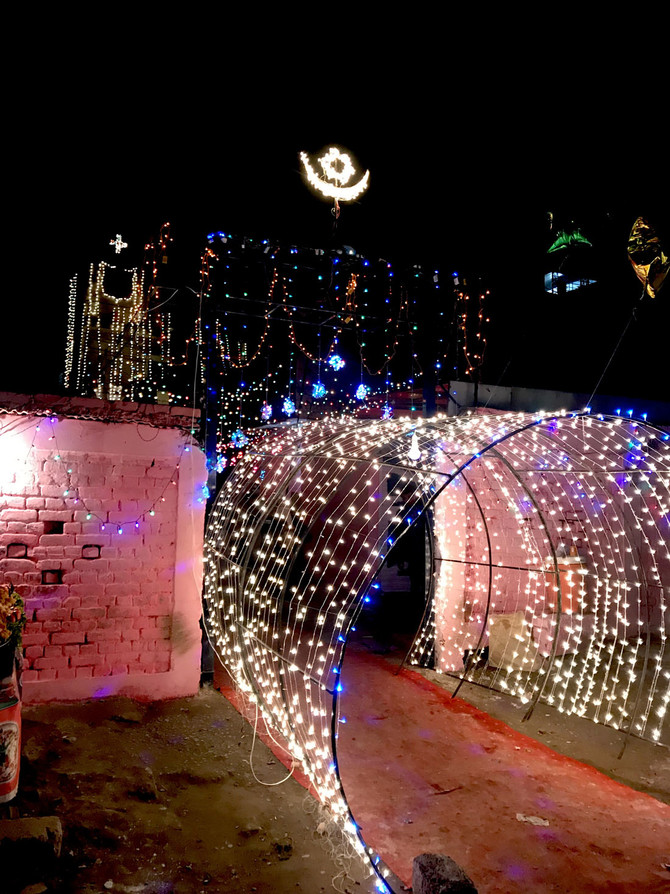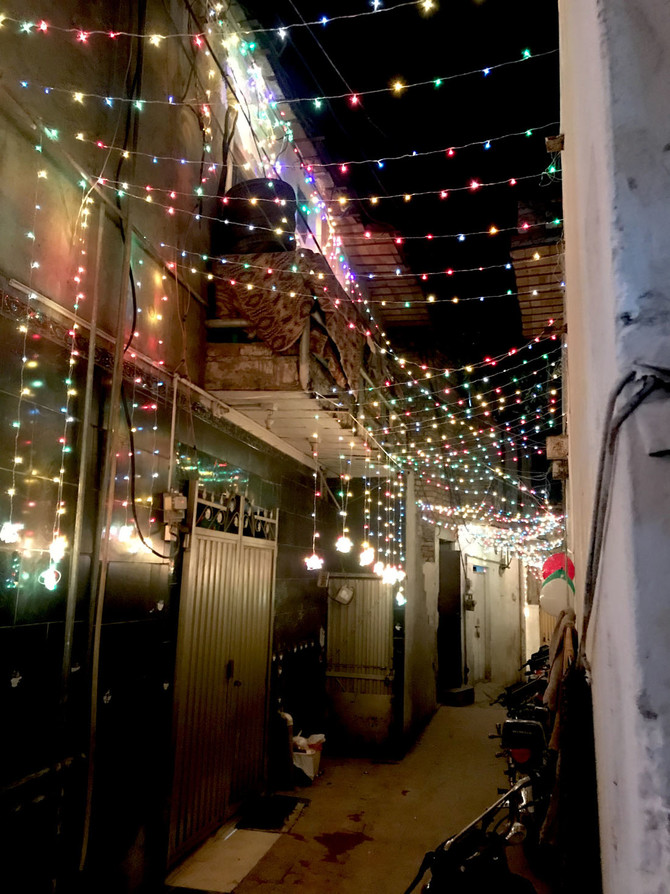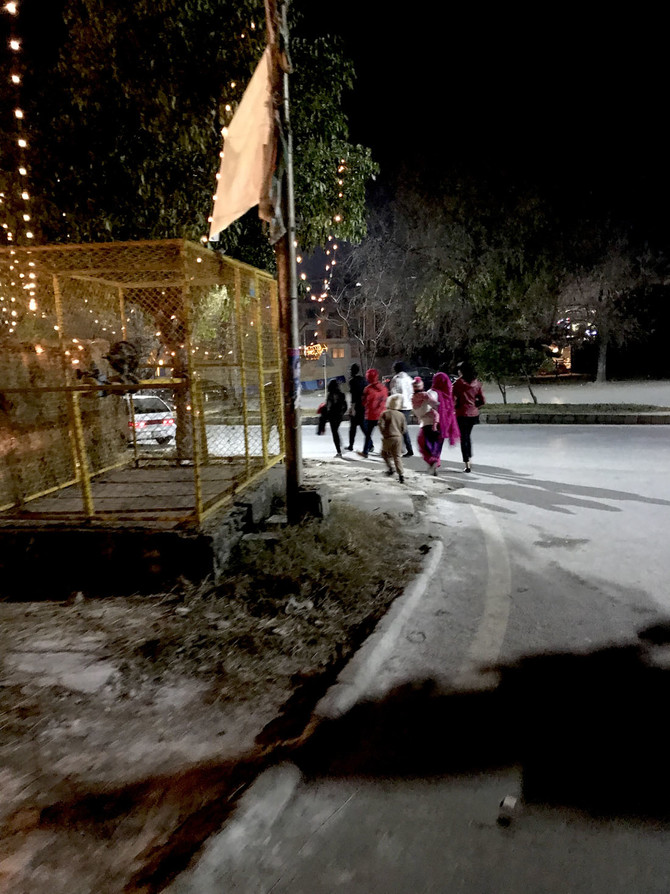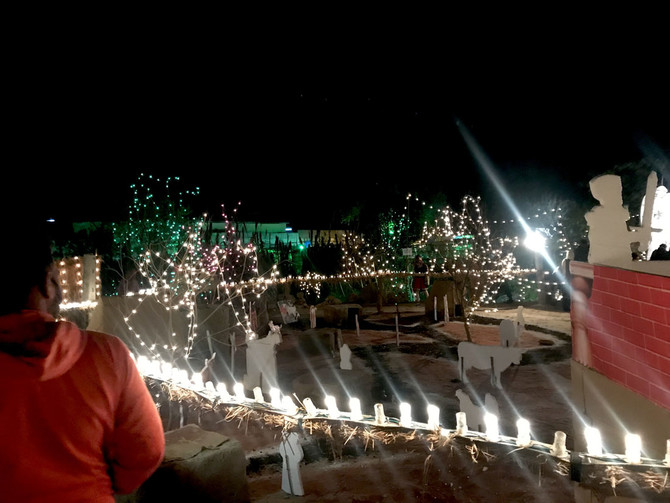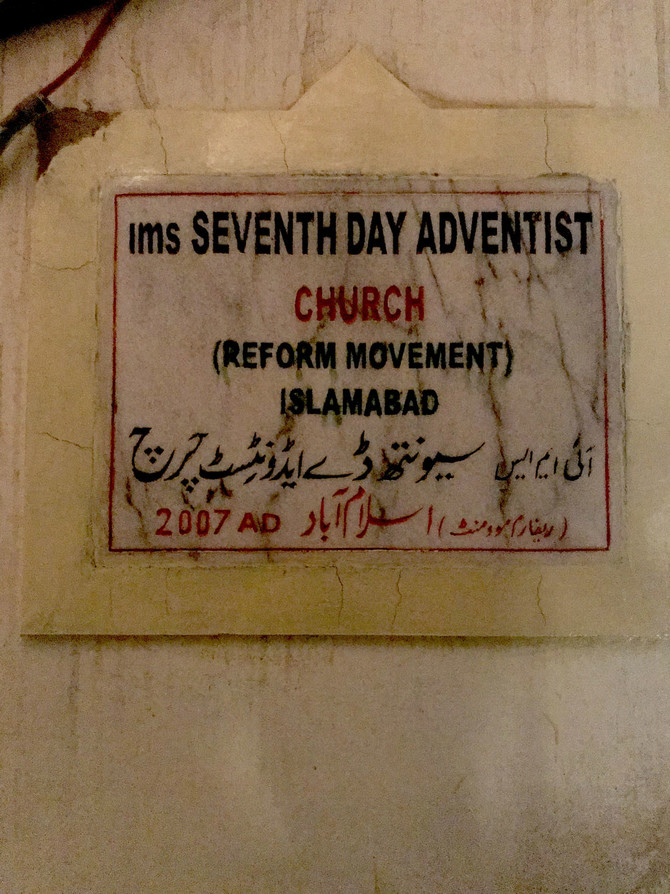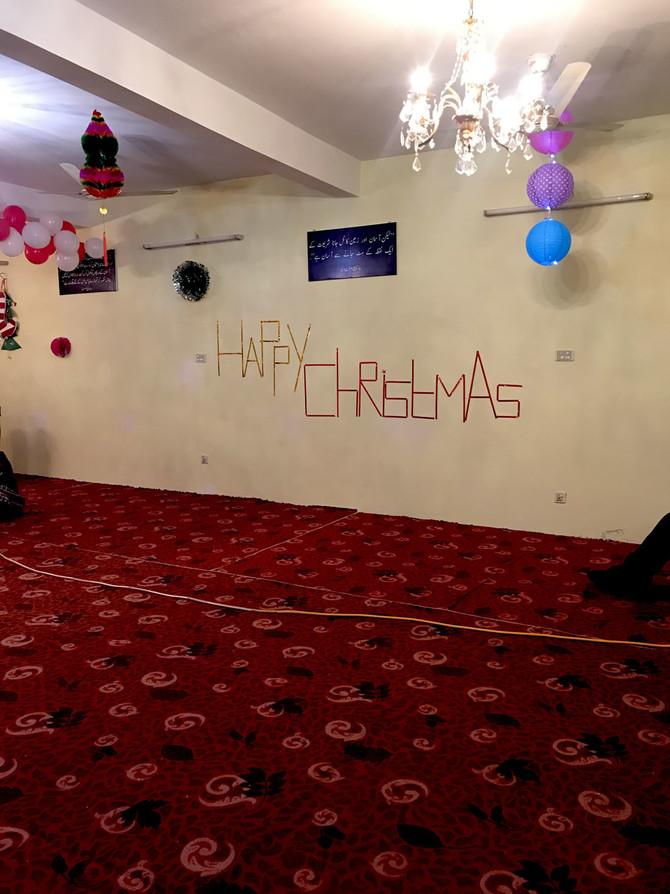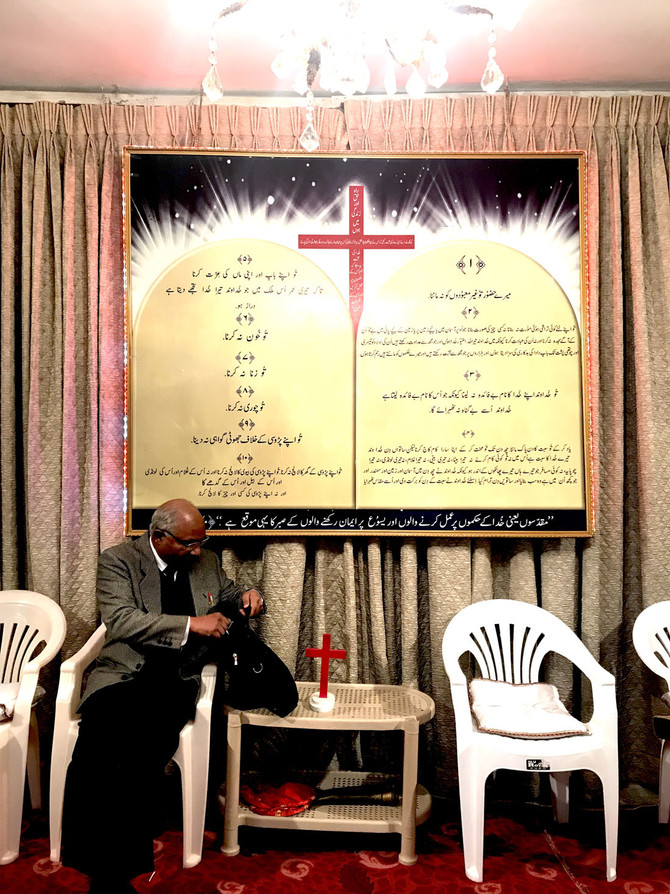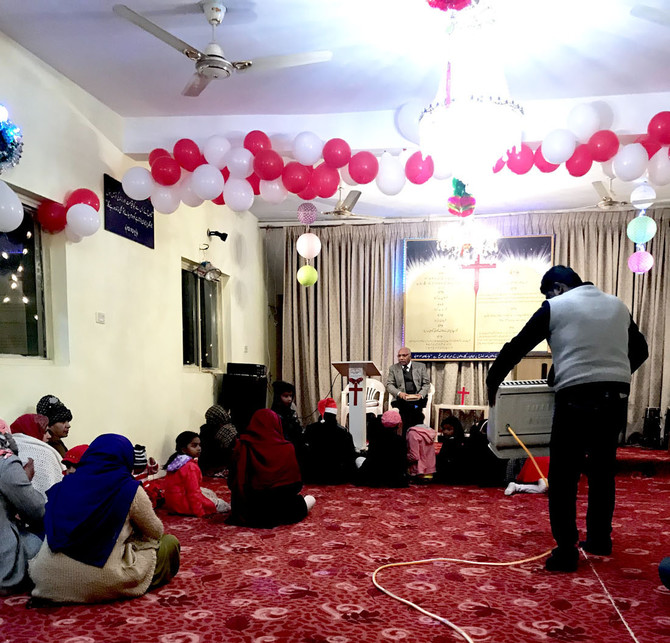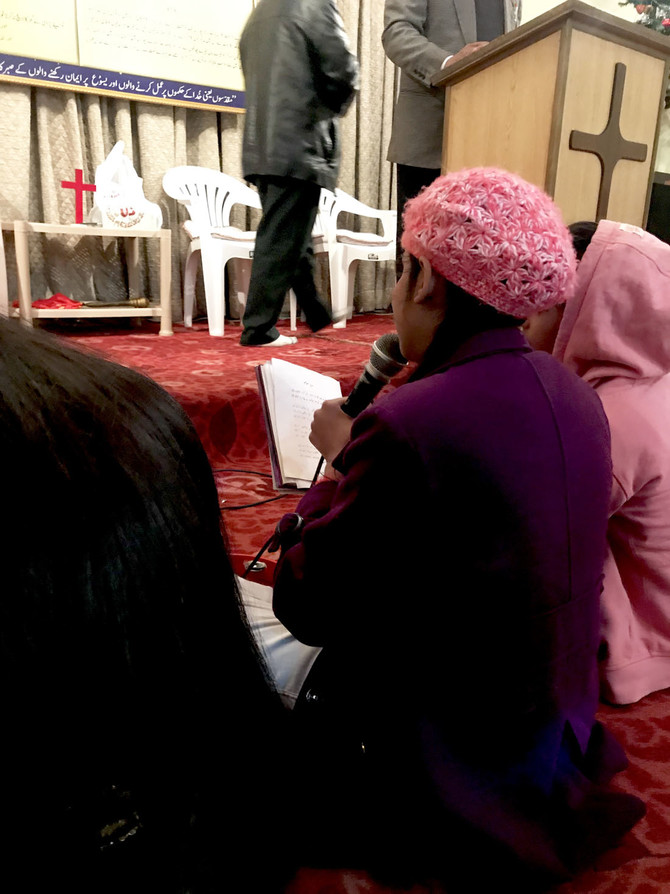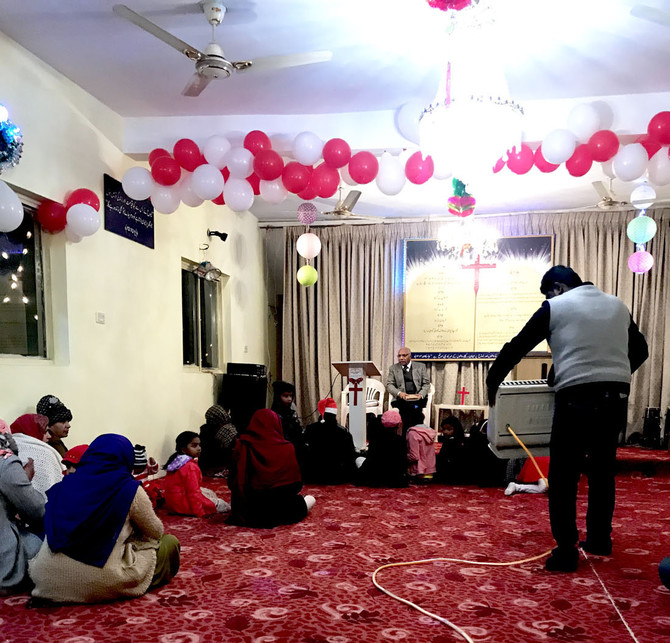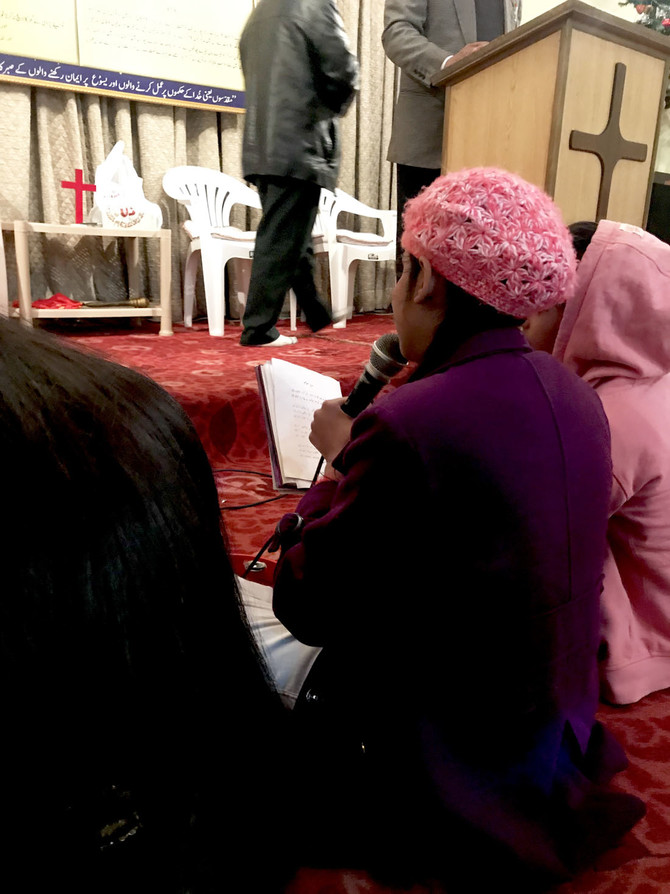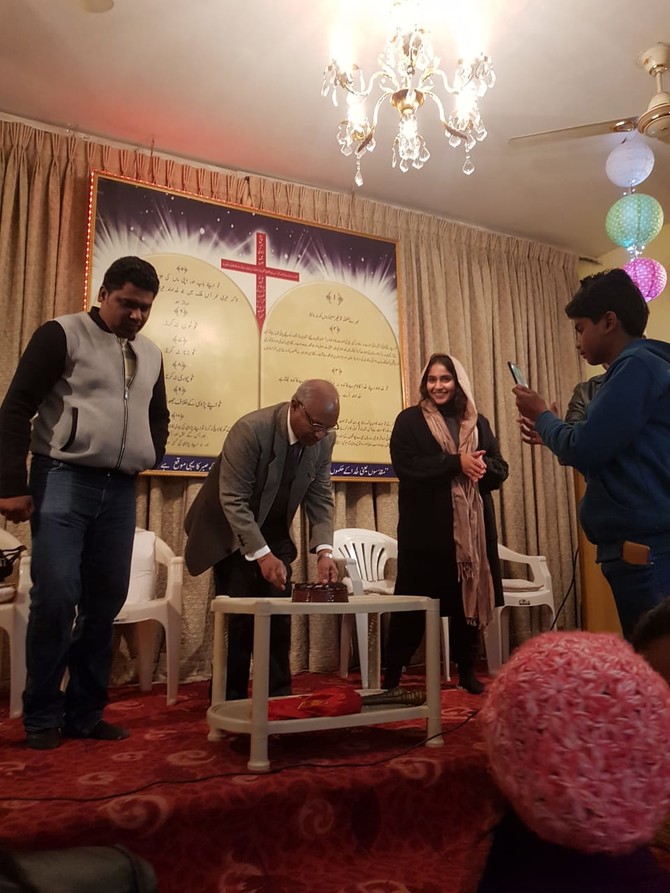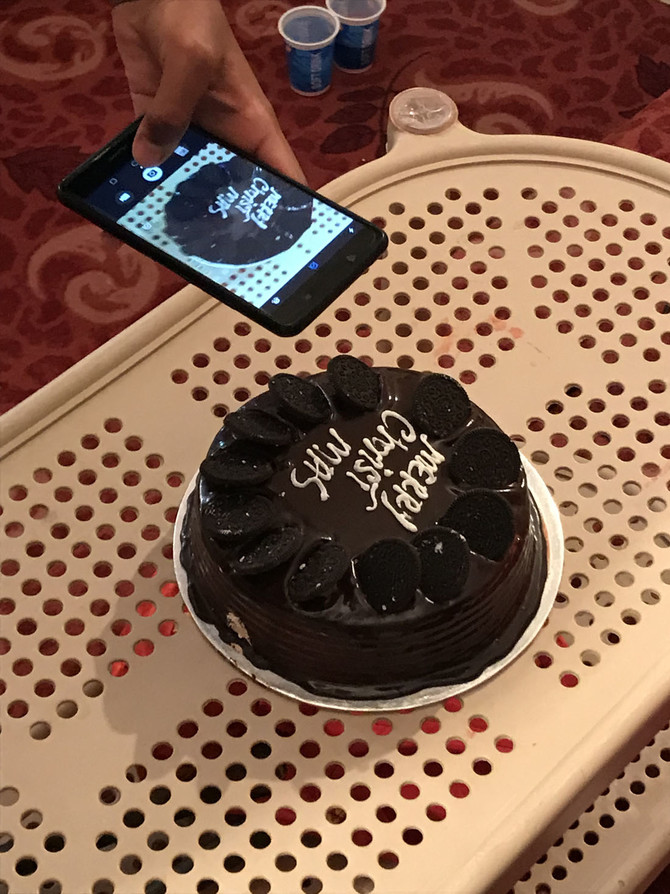ISLAMABAD: Along Islamabad’s Bhittai Road, in a quaint corner of the F7 sector, lies the French Colony where at this time of the year festive lights adorn the streets and everyone makes a conscious decision to be part of the Christmas cheer.
The distant sound of carols breaks through the chatter and laughter of children, teenagers, and families indulging in the festivities as several try to finish last minute errands to celebrate the night before Christmas.
The area which was established decades ago is what a few thousand from Pakistan’s Christian community – or approximately 1.6 percent of the total population — call home.
Empty plots surrounding the colony – which were once strewn with walls of hay and open-air tents – take on the avatar of a bride with fairy lights galore and visible from all directions. The lights act as pretty dividers for the many Christmas-themed designs along the pathways.
Three different plots have been transformed into winter wonderlands with hues of white, pink, green, blue, and purple lighting up the night sky. Several of them are designed to resemble the Nativity Scene depicting the time when Jesus Christ was born
Cutouts of important figures from the Bible and an impressive structure of a camel built from hay is part of one installation. Another had small-scale models of the Jordan River where some believe Jesus had been baptized.
A short distance away lies the Christmas market where a tunnel of lights, on top of which sits a moon and a star with the shining cross of the Salvation Army church standing tall behind it leads you to the entrance.
Here, shop owners with their finger on the consumer’s pulse sell hot cups of chai to beat the chill of a winter’s night in Islamabad. Several rangers stand guards at the entrance of the church to ensure worshippers are safe and secure as they complete their religious obligations.
“It’s always fun to see how it changes every year, what the kids put together,” Sakina, a resident of Islamabad who was accompanied by her husband, said. “The lights are my favorite part,” she said.
“You get to run into friends at times too. We like to come by here and the markets in F6 and F8 before we head to church,” Vicky, her husband, said.
Those walking through the streets to be part of the experience include people from different faiths such as Muslims, Sikhs, and some from Islamabad’s foreign community, all seen with hot cups of tea in their hands and ensuring they “Instagrammed” their night out.
Throughout the colony, churches representing different Christian sects sit side by side within a stone’s throw away from each other.
Along the main street is the Presbyterian church — standing tall with luminous red crosses – with blaring music leading worshippers to its doors.
A few turns away from the main road is the Seventh Day Adventist Church established in 2007 by Inayat Daniel Saleebi, a priest who was waiting inside to begin his sermon on Christmas Eve.
“It’s gotten much better over the years,” Saleebi said. “Each year you can feel the change, more acceptance, more open hearts. It will simply take time. Some people they say bad things, but a lot of people…it’s changing,” he added.
Saleebi, who said the church was always open to everyone, welcomed us to come in and sit through the service. He began by apologizing for the one-hour delay by promising to “keep it short, 20 minutes”, even as laughter filled the room.
Children sit around a heater, acquaintances greet one another before taking their respective seats as the church leader hands out piping hot cups of Kashmiri chai before the service begins.
Several sing along as the choir chants hymns from worn-out copies of the Bible, with a unanimous ‘Ameen’ punctuating the prayer.
On one side of the single-room church is a ‘Happy Christmas’ sign taped onto the wall using reflective tinsel, while toward the corner of the stage – where worshippers had gathered to sit — stands a Christmas tree. Bright lights line up the perimeter of a wall where a placard — listing the 10 commandments in Urdu – occupies pride of place.
The palpable level of intimacy, invitation, and inclusion is unmistakable.
In a country where the resounding majority of citizens are Muslim, Christians who live in the vicinity are lauded for forging bonds with anyone who visits the neighborhood.
“Everyone, all religions, people of faith are in some way, extremist. We all believe that we are right and that everyone else is wrong, in some way,” Saleeba, another resident, said. “However, being kind and good…that is always the same across all religions.”
As midnight struck and Christmas Eve transformed into Christmas Day, church leaders brought out a huge cake to cut on stage. What followed were scenes which are very similar to the ones we see outside mosques on Eid day – one where loved ones and acquaintances hug each other with ‘Merry Christmas’ greetings, sharing in the hope for a happy year ahead.
In that every moment, the love and warmth felt inside the church eclipsed the cold weather outside.
“Each year you can see things changing for the better”
“Each year you can see things changing for the better”

- Residents of a Christian-dominated colony share their experiences of celebrating Christmas in the country
- A majority from the 1.6% of the population live in the area in Islamabad
Pakistan says over 20,000 Hajj applications received today

- Saudi Arabia has allotted Pakistan a total quota of 179,210 pilgrims for the upcoming Hajj pilgrimage
- Quota of 5,000 has been allocated this year for overseas Pakistanis on “first-come, first-served basis”
ISLAMABAD: The Pakistani religious affairs ministry has said over 20,000 Hajj applications had been received by Monday, as the nation prepares for the annual pilgrimage slated to be held in June next year.
Saudi Arabia has allotted Pakistan a total quota of 179,210 pilgrims for the upcoming Hajj pilgrimage, to be divided equally between the government and private schemes. Around 15 designated Pakistani banks started receiving applications for Hajj 2025 from intending pilgrims on Monday.
“20,170 Hajj applications received till Monday,” a spokesperson for the Religious Affairs Ministry said on Monday, saying applications were continuing to be filed at designated banks across the country.
“Reception of applications under the government Hajj scheme will continue till December 3.”
A quota of 5,000 has been allocated for overseas Pakistanis on a “first-come, first-served basis,” the ministry said, adding that the lottery for the government Hajj scheme would be held on Dec. 6
Pakistan’s religious affairs minister this month announced the country’s Hajj 2025 policy, according to which pilgrims can pay fees for the annual Islamic pilgrimage in installments for the first time.
Under the government scheme, the first installment of Hajj dues, amounting to Rs200,000 ($717), has to be deposited along with the Hajj application, while a second installment of Rs400,000 ($1,435) must be deposited within ten days of the balloting. The remaining amount has to be deposited by Feb. 10 next year.
On Sunday, Pakistan’s religious affairs ministry said it had launched the “Pak Hajj 2025” mobile application to guide and facilitate pilgrims. The app is available for both Android and iPhone users.
Naval chief says Pakistan’s economic future ‘inextricably linked’ to maritime security

- Admiral Naveed Ashraf says challenges in Indian Ocean Region requires greater vigilance
- He says Pakistan’s socio-economic prosperity can be assured by harnessing blue economy
ISLAMABAD: Pakistan’s Chief of Naval Staff Admiral Naveed Ashraf on Monday emphasized the importance of maritime security for the country’s economic future, calling for robust measures to address “unprecedented challenges” in the Indian Ocean Region.
In a message issued to mark the Seventh Maritime Security Workshop, scheduled to run from November 26 to December 5 at the Pakistan Navy War College in Lahore, Ashraf highlighted the need to harness the country’s maritime potential while ensuring a secure environment for trade and economic growth.
He noted the Indian Ocean Region faced significant challenges, including geopolitical competition, nuclearization and transnational threats, compounded by rapid technological advancements.
“The country’s economic future is inextricably linked to the sea, which serves as mankind’s last reservoir for sustenance,” he said. “Securing our maritime domain is not merely a national priority but a necessity, requiring cooperation, innovation and vigilance.”
Ashraf stressed the potential of Pakistan’s maritime resources to drive socio-economic prosperity through the exploitation of the blue economy, enabled by a secure maritime environment.
His comments come at a time when Pakistan has made a strategic offer to landlocked Central Asian economies for access to its ports, allowing them to conduct trade via sea routes.
The initiative underscores Pakistan’s ambition to position itself as a critical hub for regional economic activity.
“Our rich maritime resources offer great potential for economic prosperity,” the naval chief maintained.
“Let us work toward a secure and stable maritime environment that benefits not only our nation but the global community at large,” he added.
One policeman killed, over 100 injured in clashes with Imran Khan supporters leading Islamabad protest

- Punjab inspector general says 119 officers wounded in violence by Khan’s supporters, party says scores of its followers also hurt
- Protest ‘long march’ has coincided with visit of Belarus president, with government accusing PTI of trying to sabotage economic recovery
ISLAMABAD: Pakistani officials said on Monday one police constable had been killed and nearly 120 were wounded in violence by supporters of jailed former premier Imran Khan’s Pakistan Tehreek-e-Insaf (PTI) party, which is leading a protest march to the federal capital of Islamabad.
Thousands of rallygoers reached the edges of Islamabad on Monday evening after protest caravans set out from various parts of the country a day earlier to call for the release of political prisoners, including Khan, among other demands.
The protesters set out despite the government refusing to grant the PTI permission to enter Islamabad for a sit-in. Last week, the district administration also imposed a two-month ban on public gatherings in the capital, citing security challenges and inconvenience to the public.
Authorities have closed all schools in Islamabad and the adjacent garrison city of Rawalpindi, while the Internet and WhatsApp messaging services have also slowed as the protest march continues. All routes connecting Islamabad and Rawalpindi have been completely shut for the last two days, as are highways and roads from other cities leading to the federal capital.
Addressing a press conference in Lahore, the provincial capital of Punjab, Punjab Information Minister Azma Bukhari said one policeman had been killed in clashes with PTI supporters.
“Constable Mubashir has lost his life. Five people remain in critical condition,” the minister said.
She added that 70 people had been wounded in clashes with the protesters just outside Islamabad, while there were reports of several other clashes elsewhere in the province. It was unclear if the 70 people were all policemen.
Inspector General (IG) Punjab, Dr. Usman Anwar, said 119 cops had been injured.
“Four of them sustained firearm injuries caused by a weapon,” he told reporters. “Our forces could also use firearms but to avoid any mishap we kept them without firearms.”
He said several police officers had critical head injuries.
“More than 22 police vehicles have been damaged. Despite this, the Punjab Police remains on duty, with 22,000 personnel still actively performing their responsibilities.”
Interior Minister Mohsin Naqvi said those who had given the call for the Islamabad protest were responsible for those who had been killed and injured.
“We have clearly communicated to all the Inspector Generals of Police, Islamabad Police, and everyone involved that those who issued this call [for protest] and incited people to gather will be held fully responsible for these actions and we will not leave anyone,” Naqvi said at a press conference after attending the funeral prayers of the policeman who was killed during the protests.
“FIRs [police report] will be registered against all of them. The protesters have fired live bullets, and our security forces could also do the same, but they only answered with rubber bullets.”
Khan’s party said scores of its workers were also hurt.
“TILL MY LAST BREATH”
The PTI march started on Sunday but could not reach Islamabad as shipping containers placed by the government on key points on major highways slowed the pace of the caravans. The PTI says its final destination is D-Chowk, a high-security area in the capital’s Red Zone that houses key government buildings and is a popular site for protests. Heavy contingents of police and other security forces have been stationed across Islamabad and at entry and exit points.
The largest PTI protest caravan began its journey from Peshawar, the provincial capital of the Khyber Pakhtunkhwa (KP) province where Khan’s party is in power. It is being led by KP Chief Minister Ali Amin Gandapur and Khan’s wife Bushra Khan, who was released on bail in October after nearly nine months in detention.
Khan has been in jail since August last year and faces a slew of charges he says are politically motivated.
On Monday evening, the PTI said in a text to reporters that the rally had “broken through one of the biggest barrages of containers and is at the gate of Islamabad.”
“Until Khan does not return to us, we will not end this march,” Bushra said to supporters from atop the protest caravan as the PTI edged closer to Islamabad. “I will stand there till my last breath, you people have to stand by me. I will keep standing even if nobody does because this does not concern just my husband but the country and its leader.”
Islamabad police confirmed over 400 arrests related to the protest in the past few days, saying the detainees were being held in different police stations. The PTI said over 3,500 of its leaders and supporters had been arrested in connection to the protests.
PTI leader Shaukat Yousafzai, who is part of the caravan, told Arab News over the phone the march would carry on until it reached D-Chowk.
“We will only return from D-Chowk when Imran Khan and other innocent party workers are released from Pakistani prisons,” he said.
The PTI also said key leaders Gohar Khan and Ali Mohammad Khan had been allowed to meet the PTI flounder at Adiala jail, but no details were shared about the focus or outcome of the discussions. A second meeting with Khan was also reported late on Monday night.
The PTI’s march has coincided with a visit to Islamabad by Belarusian President Aleksandr Lukashenko and a 68-member delegation to discuss investment deals. The government has accused the PTI of trying to sabotage the foreign visit in a bid to destabilize its economic recovery efforts.
Yousafzai rejected this criticism, saying his party had called the protest well before the Belarusian delegation’s arrival was announced.
“We have not blocked the roads,” he added. “The government has blocked the roads, creating a situation like this. The government should have held talks with the PTI instead of blocking the roads.”
Wheel-jam strike paralyzes Balochistan highways amid protest over kidnapped schoolboy

- 11-year-old Muhammad Musawir Khan was kidnapped by armed men in Quetta on Nov. 15
- Government says law enforcement agencies are working for the kidnapped boy’s recovery
QUETTA: A wheel-jam strike paralyzed highways in Pakistan’s southwestern Balochistan province on Monday as protests over the kidnapping of an 11-year-old schoolboy entered their 11th consecutive day in Quetta.
Muhammad Musawir Khan, a third-grade student, was kidnapped from a school van by unknown armed men while on his way to school on November 15.
The family has not received any ransom call from the kidnappers in all these days since his abduction. They have also categorically said they will not pay a single penny to the kidnappers.
“Today, all national highways connecting Balochistan with the rest of the country are closed against the kidnapping of my son,” Raz Muhammad, the boy’s father, told Arab News. “We will continue our protest until he safely returns home.”
Muhammad urged Prime Minister Shahbaz Sharif and Army Chief General Asim Munir to consider Khan as their own child and play a role in his recovery.
Other family members echoed the sentiment, saying it was the state’s responsibility to ensure the boy’s recovery and improve the general environment of insecurity.
“We have been sitting here for the last 11 days to seek protection for all children like Muhammad Musawir Khan from these kidnappers,” Hajji Malang, the boy’s uncle, told Arab News. “Whoever kidnapped our child, we will not bargain with them for his release.”
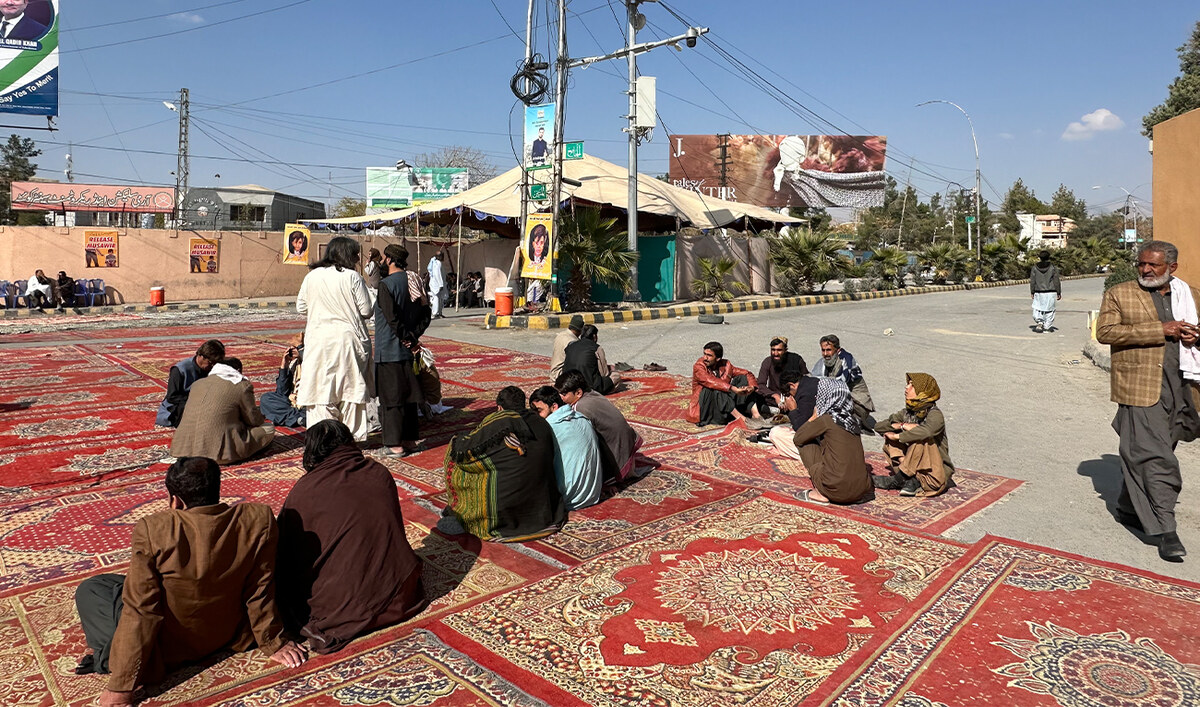
The kidnapped boy belongs to a prominent tribal family involved in the gold trading business in Balochistan for decades. According to the family, he was abducted from Patel Bagh, a busy neighborhood in Quetta.
Political and religious parties, traders, transporters, lawyers and civil society members have all been visiting the protest camp to express solidarity with the family and demand the immediate and safe recovery of the boy.
Speaking to the media outside the provincial assembly, Chief Minister Mir Sarfraz Bugti said he thought of the kidnapped child like his own son.
“We are utilizing our full capacity and the government is making serious efforts to ensure his safe recovery,” he said.
Commissioner of Quetta Division Hamza Shafqaat shared the same update while speaking to Arab News.
“The government, along with all law enforcement agencies, is working diligently for the recovery of Muhammad Musawir Khan,” he said.
“We have shared our report on the progress in the recovery of the kidnapped boy to with the Balochistan High Court, chief minister and the provincial assembly, and they have all expressed satisfaction that the investigation is heading in the right direction,” he added.
However, Shafqaat declined to divulge details of the ongoing investigation.
Malik Muhammad Sadiq Kakar, senior member of Pashtoonkhwa Milli Awami Party, said that highways in Balochistan’s Quetta, Mastung, Khuzdar, Killa Abdullah, Chaman, Zhob, Killa Saifullah and Loralai districts were closed to protest the kidnapping of the child.
“We are sitting with the family of the kidnapped boy to express solidarity because we want peace in Balochistan,” he told Arab News.
Pakistan’s restive Balochistan province, which shares borders with Afghanistan and Iran, has been the site of a low-level insurgency by separatist militants for over two decades.
Other extremist factions, including Tehreek-e-Taliban Pakistan and Daesh’s Khorasan chapter, also have a presence in the region and frequently attack security forces and civilians.
Last week, Pakistan approved a “comprehensive military operation” in the province, targeting ethnic Baloch separatist groups attacking security forces and Chinese nationals working on the multibillion-dollar China-Pakistan Economic Corridor (CPEC).
COMSTECH, Pakistani conglomerate announce internship program for OIC member countries

- International program hosted by Gourmet Industries, the largest food processing complex in Pakistan
- Selected candidates will receive accommodation, meals, and return economy-class air ticket to Pakistan
ISLAMABAD: The OIC Standing Committee on Scientific and Technological Cooperation (COMSTECH), in collaboration with Pakistan’s Gourmet Industries, has announced the COMSTECH-Gourmet Industrial Internship Program for its first batch in January 2025, state news agency APP reported on Monday.
Hosted by Gourmet Industries, the largest food processing complex in Pakistan, the program offers 10 internships lasting four weeks. Selected candidates will receive accommodation, meals, and return economy-class air ticket to participate in the program, which aims to promote innovation, research, and skill development across various industrial sectors, offering participants practical training and exposure to advanced technologies and industrial processes.
The program will focus on key areas in food industry operations including bakery, dairy, and beverages, plant utilities, recycling through innovative RPET methodologies, shrink-wrap production, sugar mill logistics, and media training in journalism and broadcasting. Participants will gain hands-on experience in supply chain management, production processes, and sustainability practices also.
“The internship is open to applicants from OIC member countries holding a BS/BSc or MS/MSc in relevant fields and under the age of 40,” the report said.
“The objective of the COMSTECH-Gourmet Industrial Internship Program is to foster innovation and research and development (R&D) across diverse industrial sectors, including food processing, engineering, plant operations, recycling, and so forth.”
The program will provide interns hands-on experience and exposure to cutting-edge technologies and methodologies, thereby enhancing their practical skills and theoretical knowledge.
“By engaging in real-world projects, interns will contribute to the advancement of industrial processes and the development of sustainable solutions, ultimately driving technological innovation and improving operational efficiencies in the fields of human nutrition and value addition,” APP added.
“This initiative underscores COMSTECH’s mission to empower youth in OIC nations and advance technological development for socio-economic progress.”
Applicants have to complete an application form and upload requested documents (CV, Research Proposal, etc.) at: (https://form.jotform.com/243101366016444) till Nov, 30. Applicants can contact [email protected] for further information.



